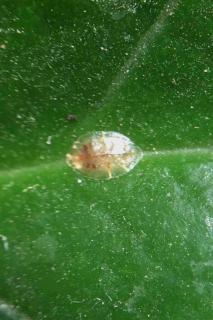Scale insects appearing on a ZZ plant is a rare occurrence. Getting rid of them isn’t too difficult onZamioculcas zamiifolia.
Facts about scale on a ZZ plant
Name – Coccidae
Common name – soft scale
Lifespan – up to a year (dormant in winter)
Size – 1/4th inch (5mm)
Danger to plant – fatal if infested
Contagious – to many houseplants
Main treatment – fermented nettle or oil/soap/alcohol mix
Thanks to Jessica Everett for sharing her experience!
Identification of scale insects on a ZZ plant
Scale insects feed by sticking their sharp mouthpieces into a leaf vein.
- Younger scale insects that are still in their initial stages of life aren’t yet very powerful. They tend to feed around the rims of the leaves and in the space between larger veins. They’re also much smaller and harder to see than adults.
- Adults, especially females, usually secure a spot near the center leaf vein. They settle down on the topside of leaves where the fold provides some protection.
Females secrete a waxy cover under which they lay eggs that hatch after two to three weeks. This cover looks like a brown oval about a fourth of an inch (5 mm) long.
- These scale insects will also infect other ZZ plant cultivars, like the black zamioculcas raven and the cute Zenzi ZZ plant.
How to treat against scale insects
Spray against scale insects
The best recipe is to mix following ingredients:
- 1 quart (1 liter) of water
- 1 teaspoon dish soap
- 1 teaspoon vegetable oil (using neem oil will increase the pest-killing effect)
- and 1 teaspoon 90-proof alcohol.
Spray this solution daily for 3 to 4 days.
An effective alternative is home-made fermented nettle.
If the plant is overrun with scale insects
First, get rid of most of the pests by hosing the plant down with water using a showerhead or low-pressure powerwasher.
- Wrap the pot in a plastic bag to protect the root ball and lower stems. Tie a string or rubber band around the stems to close it.
- Place this in your bathtub, shower area, or outside in a place that can wet.
- Hose the plant down one stem at a time to remove most of the scales with water pressure.
After that, apply the spray as described above.
If the pests are few and sparse
 Usually, you’ll catch the invasion early on. It’s great to act fast, since a single scale insect can lay hundreds of eggs, and do so multiple times…
Usually, you’ll catch the invasion early on. It’s great to act fast, since a single scale insect can lay hundreds of eggs, and do so multiple times…
Scrutinize your plant with a cotton bud or wad of cotton dipped in high-content alcohol (vodka, gin, or rubbing alcohol work fine). Every time you see a scale insect, swab it over and remove it. The alcohol dissolves its waxy protection.
- It’s best to rinse or wipe after applying alcohol to keep the plant healthiest, but usually the quantity is small enough that the plant won’t suffer.
- Don’t spill alcohol on the plant. Too much of it, especially if it gets to the roots, would kill the plant!
Read also:
Images: Nature & Garden contributor: Jessica Everett
Written by Gaspard Lorthiois | Loves helping out, especially when it comes to growing things. Worked in herbal medicine, runs a farm, and dabbles in tech. Master's degree and engineer.


 Usually, you’ll catch the invasion early on. It’s great to act fast, since a single scale insect can lay hundreds of eggs, and do so multiple times…
Usually, you’ll catch the invasion early on. It’s great to act fast, since a single scale insect can lay hundreds of eggs, and do so multiple times…